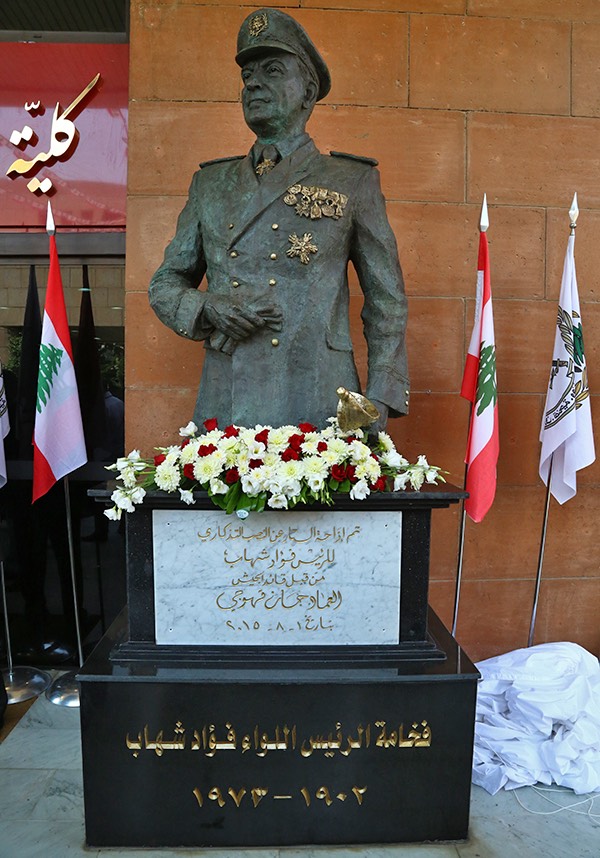Events
“European Union and Us”
July 5, 2019 – Phoenicia Hotel, Beirut
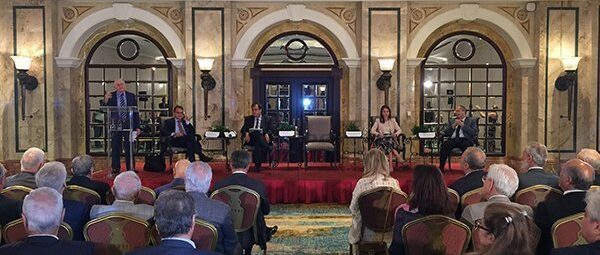
The conference was organized by the Fouad Chehab Foundation, and the eminent guest-speakers were: Christina Lassen, Ambassador of the European Union; Bruno Foucher, Ambassador of France; Georg Birgelen, the Ambassador of Germany; and Tarek Mitri, former Foreign Minister. The President of the Fouad Chehab Foundation, former Minister Charles Rizk, presented the speakers and moderated the symposium.
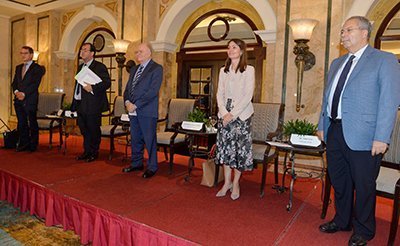
The National Anthem
The event was attended by the Minister of State for Administrative Development Affairs, May Chidiac; MP Anwar Jumaa; representatives of the Ministers of Foreign Affairs, Justice, Energy, Economy, Agriculture and the Displaced; representatives of MPs Taymur Jumblatt and Sami Gemayel; former ministers Ibrahim Shamseddine and Mueen Al Marabi; former MPs Musbah Al Ahdab and Antoine Saad; the counselor at the Russian Embassy, Dimitri Lebedev; officials from the embassies of the United States of America, Saudi Arabia, the United Arab Emirates and Morocco; in addition to a number of diplomatic, political, media, judicial, educational, military and economic personalities, and members of the Fouad Chehab Foundation.
Rizk
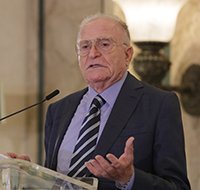
Dr. Rizk
Dr. Rizk gave the opening speech in which he welcomed the speakers and the audience. He said:“This series of lectures, founded on initiatives of a diplomatic nature, is inspired by President Chehab’s style of governance . Therefore, we wanted to dedicate our 2019 series of lectures to diplomatic topics and matters related to Lebanon and its surroundings. We started this series on June 11 with the Russian Ambassador who addressed us with great openness. Today, our second seminar is dedicated to Lebanon’s relationship with the European Union and its impact. This will be followed by other seminars, the next one being with the Chinese Ambassador under the topic of “China and Us” in September.”
Ambassador Lassen
In her intervention, Ambassador Lassen said: “The European Union is working to support Lebanon in the difficult situation it is going through. Our cooperation has evolved from the mere providing of humanitarian aid to a structural support of Lebanese institutions. In the last nine years, the EU has increased its support to Lebanon more than 7 times, in order to meet the challenges of terrorism, border protection, economic development, fighting pollution and protecting the environment. There are more than 100 people working for the European Union in all of Lebanon today, and there are more than 300 projects underway in the country. We regard Lebanon as a main ally in the region: It is close to Europe through its historical and cultural ties, because of the important political dialogues that have taken place here and in Brussels, and because of the partnership agreement signed by the two sides.”
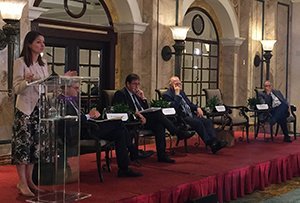
Ambassador Lassen
“We are trying to bridge the commercial trading imbalance between Europe and Lebanon, and to this end, we have made contacts and taken measures to facilitate the access of Lebanese products to European markets. The European Union is investing around 1.7 billion euros in Lebanon. If we add to this the aids from individual European countries, the amount reaches 4 billion euros, which is a proof of Europe’s commitment to helping Lebanon”, she added.
“We will be increasing our support towards projects in the fields of education, improving infrastructures, providing clean water, and Waste Management. We are also effectively engaged in providing support to the various security sectors in the country (Army, Security Forces, airport security). You will start noticing changes at the airport with the implementation of a new system for speedy and more efficient security checking. In the economic development field, we have launched a very large program in Tripoli on issues related to youth, unemployment, and the rehabilitation of identified neighborhoods and areas. We will increase our funding so we can boost the economy cycle”, she said.
Lassen added, announcing new support projects: “In order to help meet the Cedar Conference requirements, we will provide 150 Million euros to help with investments. The amount of loans that we will make available can reach 5.3 Billion. The structural reforms will be essential in order to attract investments. We, therefore, hope that the Government will implement the required reforms. These are in Lebanon’s interest in order to move the economy forward and improve the infrastructure. We are pleased that the Lebanese government, as per its commitment in the Cedar Conference, is engaged in fighting corruption and has created an anti-corruption commission. Regarding the judicial system, we are happy that many steps have been taken at the court level to increase transparency”.
Ambassador Foucher
French Ambassador Foucher, presented the policy adopted by France regarding the Arab World. “This policy,” he said, “dates back to the times of General Charles de Gaulle, who wanted to take a distance from the United States’ policy in the region and be independent. It is the policy that was later adopted by Europe. We also wanted to distance ourselves from Israel and be open to everyone, including the Arabs. We wanted to use foreign affairs’ tools to intervene in global crises. It is this same policy that French President Emmanuel Macron follows today.”
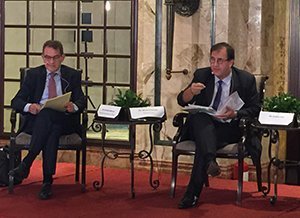
Ambassador Foucher
He added: “France works for a Europe that is independent from the protection of the United States as it was in World War II. This is in principle in matters related to the Security Council, the European Army and the European axes. The debate regarding the creation of a European army is becoming more and more important. The latest development on the matter was the creation of a 15 billion euros fund for armament. Europe is now able to fund all research in this matter as a first step that paves the way for its military operations.”
The French ambassador also said: “President Trump’s positions on Jerusalem and the settlements, and the Kushner initiative are highly controversial. President Macaron wishes to take many measures to restore Europe’s dynamism, and make it a great independent power. I believe that Europe has developed considerably along these lines over the past 40 years.”
He added: “The Iranians told me recently: ’Europe does not have presence; you are not strong enough and able to face the United States policies. You are divided and you do not have an independent policy.’ I replied: ’You are underestimating the efforts we have put to create INSTEX, an instrument that enables us to circumvent the US embargo and start trade operations that are independent from the dollar. We are making huge efforts using these tools, and here lies our strength’.”
Ambassador Birgelen
German Ambassador Birgelen explained that the support that the European Union gives to Lebanon is not just a joint effort, but bilateral efforts in many fields.
He pointed out that “the Cedar Conference has imposed many conditions, including administrative and structural reforms to the Lebanese state’s apparatus, and the question today is: ‘Is Lebanon still adhering to these conditions?’. The Lebanese parliament is still working on the budget, and we hope that it gets approved next week and that it will bring a reduction to the percentage of the deficit, which is still high. I believe that the budget is good, but it must be accompanied by additional measures and regulations. There is a strong need to fight corruption.”
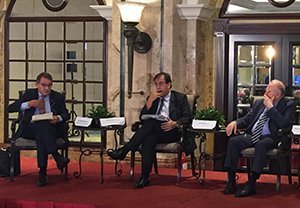
Ambassador Birgelen
“When I joined my post in Lebanon a year ago,” he shared, “I found it to be a unique country, though not reassuring at the geopolitical level. I wondered how the political system could stay intact while all the regimes around you are shaking. I look at that with wonder and appreciation.”
Regarding the differences that Europe and the US hold in regard to Iran, Birgelen said: “It is true that not everything that President Trump says is wrong, but we do not share the idea that Iran should be eradicated from existence, or that it is the axis of evil. We do see that it interferes in the internal affairs of the countries of the region, including Lebanon through Hezbollah, and that these interferences are not a good thing. The question is, ‘How will you tackle this?’ It is hard to imagine what could happen if a large scale conflict erupts in the region.”
About the Syrian refugees, he said: “The number of Syrian refugees in Lebanon as compared to the Lebanese population is unacceptable. And we do not link their return to a political solution to the conflict in Syria. Instead, what we call for is to follow the United Nations and UNHCR’s principles and criteria, which are that the return is voluntary and respects the dignity and safety of the refugees. My belief is that they are not returning because they are afraid of getting arrested and deprived of their most basic rights. In my opinion, their return, requires opening talks with the Damascus government.”
Mitri
The last speaker was former foreign minister Tarek Mitri. He said: “The Europeans are committed to bringing prosperity and progress to Lebanon, but there are doubts about this commitment and a lack of complete awareness of it. Some often repeat that Lebanon is important in itself for historical reasons, while others consider that Lebanon has lost today its special place because of the changes in its regional role and the disintegration that has hit the whole region, because the European policy focuses today on fighting terrorism and dealing with the flow of displaced people.”
He continued: “The Lebanese see the European Union as donor-countries and always expect more unconditional support. But this kind of support doesn’t exist anywhere in the world. They want more money to get injected so that the Syrians can live here, and that they do not reach a level of desperation that leads them to a chaotic immigration similar to what happened to the Libyan people.”
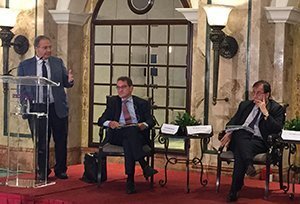 And he added: “There are many human rights and civil society organizations that enjoy the EU support, but it is difficult to measure the influence that this support has on human rights policies in the country.”
And he added: “There are many human rights and civil society organizations that enjoy the EU support, but it is difficult to measure the influence that this support has on human rights policies in the country.”
In the media:
– National News Agency
– Annahar
– www.china.org.cn
– L’Orient-le-Jour (before the event)
“Russia and Us”
June 11, 2019 – Phoenicia Hotel, Beirut
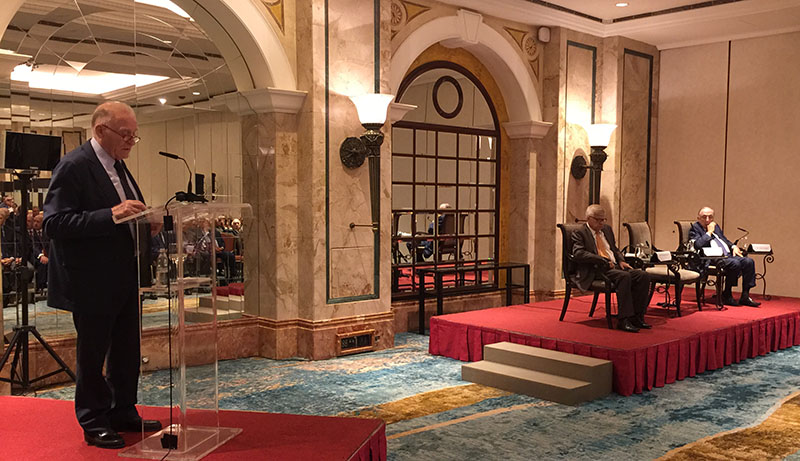
On June 11, 2019, the Fouad Chehab Foundation held a seminar at the Pheonicia Hotel, under the theme “Russia and Us”. The speakers were the Russian Ambassador to Lebanon Alexander Zaspikin and journalist Samir Atallah. The event was attended by a large number of former MPs and ministers, in addition to a large array of political, diplomatic, media, judicial and military figures along with members from the Fouad Chehab Foundation. 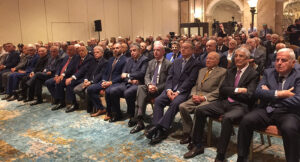 The most prominent attendees were former President of the Republic Michel Suleiman; former Speaker Husseini al-Husseini; the Ambassadors of Syria, Ali Abdul Karim Ali; of Sudan, Ali Sadiq Ali; and of Armenia, Vahagn Atabekyan; Rodrigue Khoury, representing Foreign Minister Gebran Bassil; former Minister Ghazi Aridi; and the Honorary President of the Fouad Chehab Foundation, Major General Ahmed al-Hajj.
The most prominent attendees were former President of the Republic Michel Suleiman; former Speaker Husseini al-Husseini; the Ambassadors of Syria, Ali Abdul Karim Ali; of Sudan, Ali Sadiq Ali; and of Armenia, Vahagn Atabekyan; Rodrigue Khoury, representing Foreign Minister Gebran Bassil; former Minister Ghazi Aridi; and the Honorary President of the Fouad Chehab Foundation, Major General Ahmed al-Hajj.
Dr. Rizk
The President of the Fouad Chehab Foundation, Dr. Charles Rizk, gave the welcoming speech, in which he introduced the speakers and described the various stages that governed the relationship between Russia and Lebanon: The absence of any relationship during the Stalin era; the Nasser period in Egypt and Syria with privileged relationships with the USSR; and Egyptian President Anwar Sadat’s shift towards the USA, leading to the decline of the relationship with the Soviet Union.
Dr. Rizk spoke about the activities undertaken by the Fouad Chehab Foundation, and reminded of its objective to reinforce ‘Chehabism’. “This Chehabist approach,” he said, “proved successful in the history of Lebanon. The most important element in it was the policy of positive neutrality in international relationships. This was best manifested in President Chehab’s famous meeting with Nasser at the border between Lebanon and Syria, which reassured Nasser of Lebanon’s neutrality, and allowed Chehab to focus on internal reforms, while safeguarding Lebanon’s sovereignty.”
He announced that the Foundation is initiating “a series of seminars revolving around diplomatic and foreign affairs matters, the first one being the present one, to be followed by a second one on July 5, with the theme “The European Union and Us”, to take place at the Phoenicia Hotel also.”
Samir Atallah
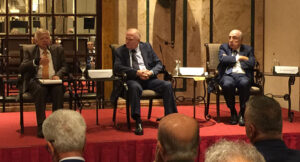
In his intervention, journalist Atallah said that “Lebanon’s relations with Russia during pre-communist Russia, the Soviet period, and the present Putin times, have always been relations of friendship and respect.” He added that Moscow has been “a friend, an ally and a partner in Defense Treaties, as opposed to the USA’s ways.”
Atallah criticized the move by late Egyptian president, Sadat, to expel 20 thousand Soviet experts in the early seventies, stressing that “nothing similar has ever happened in the world’s politics.” Mentioning that some “had accused the Soviet Union of the 1967 setback, he defended its role at the time, adding that what Moscow had endured during that period was more than an ally or a friend would have endured.”
“What have we offered to the Russians in return? Nothing, of course. We did not even promise Russia anything; while at that same time, Russia was giving us arms, and the Palestinian Resistance set all its hopes on the Soviets to regain those rights. But soon after, Yasser Arafat adopted a ‘pragmatic’ policy, shifting away from Moscow.” Atallah said that the relation between Russia and the US has recently been troubled, and that the European Union’s role was weak, stressing that Moscow had a role to play in the region with all countries, including Israel.
Ambassador Zaspikin
In his intervention, Ambassador Zaspikin stated that “the world is going into a transitional phase at the level of regimes, with each country trying to establish a stronger presence. But all this is temporary.” He added: “The existence of one single pole previously, led to disasters for people. There must be a true balance, not a bipolarity like at the times of the Soviet Union versus the Americans.”
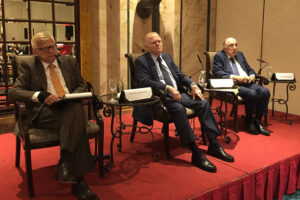 “Russia’s goal today is to find a balance in international politics. We are open to working with whoever wants to collaborate. We want to work as part of a team.” He criticized “those who believe that Russia has an imperial ambition”, noting that “any thought of returning to the time of the Soviet Union is wrong.” The ambassador described the actions of the Baltic republics as a “mad party backed by the West.” He denied any Russian interventions in America or Europe, using the term ‘Russia Phobia’ to describe these accusations.
“Russia’s goal today is to find a balance in international politics. We are open to working with whoever wants to collaborate. We want to work as part of a team.” He criticized “those who believe that Russia has an imperial ambition”, noting that “any thought of returning to the time of the Soviet Union is wrong.” The ambassador described the actions of the Baltic republics as a “mad party backed by the West.” He denied any Russian interventions in America or Europe, using the term ‘Russia Phobia’ to describe these accusations.
Zaspikin explained that the development in Russia’s relations with other countries goes according to their potentials, and that this applies to countries in the Middle East where Russia has interests, especially in the fields of security and development. He refused the usage of incitation, advising others not to create seditions and agitations, whether democratic or religious. He stated that Russia stood against such revolutions, referring to what happened in the sixties in some Russian countries.
Recalling the disintegration of the Soviet Union, he hoped that the same doesn’t happen to the Arab countries. He pointed out that the Russian presence in Syria was at the request of the Syrian State, expressing his consent to political relations, but without the direct intervention of foreign powers. He described what happened in the Ukraine as a staged coup, and reiterated Russia’s position in rejecting all types of terrorism. He strongly criticized the West’s policy of direct intervention, staging revolutions, and fueling incitement; and referred to what happened in the countries neighboring Russia, through ‘colored’ revolutions.
Talking about the Iran-US Nuclear Agreement, Zaspikin said that Iran had all the right to build its own nuclear power, and criticized the US’s withdrawal from the Agreement. He accused the US of “working to destroy International Legitimacy, when imposing sanctions and economic wars, and weakening the UNRWA. All this will lead to difficulties for some countries, but at the same time it encourages these countries to find their own solutions.” He pointed out China’s strong role and the foggy European position due to American pressures. Zaspikin called for “unity and cooperation with the countries of the world and the Middle East in particular, especially in the fight to eliminate terrorism, stand against sanctions, and build economic cooperation.” He strongly criticized the actions of the US and its allies, which aim to control the world, and said that the whole world picture will become clearer in the next 5 years.
Question and Answer
This was followed by a Question/Answer session, during which, the Russian ambassador, answering questions put to him by attendees and journalists, said that “Russia’s support to the regime in Syria came as a response to the terrorist attack that the country faced.” He added: “Our clear position was to stand by the Syrian regime. We had not intervened in Libya, and we saw what happened to that country afterwards and to Yemen.” He expressed Russia’s concern about some particular events, and denied that the Syrian regime is responsible for the displacement that took place.
In the media: Al Hayat – National News Agency – L’Orient-le-Jour – Annahar
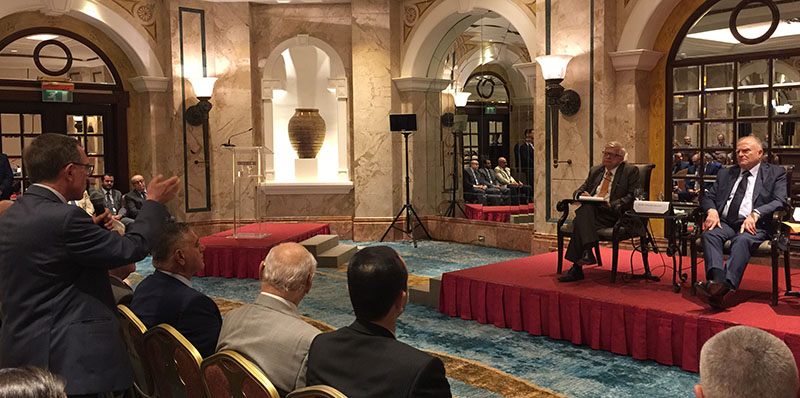

Honoring Fouad Boutros
October 4, 2016 – St Joseph University, Beirut
In honour of former Minister Fouad Boutros, who passed away at the beginning of 2016 at the age of 98, the Fouad Chehab Foundation organised a special event to show respect to its founder and honorary president, who was one of the closest assistants to President Chehab.
The event took place at the St Joseph University in Beirut, in the Pierre Abou Khater auditorium. The speakers for the occasion were, Dr Chafik Muharram, President of the Foundation, Dr Charles Rizk, former Minister and former vice-president of the Foundation, Mr. Sarkis Naoum, prominent journalist and close friend of Minister Boutros, and George Fouad Boutros, the son of the regretted.
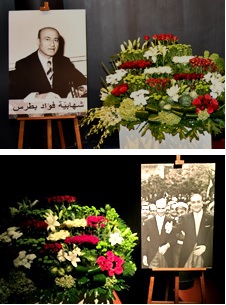
The audience included: Former President of the Republic, Michel Suleiman, former Speaker, Hussein El Husseini, MP Muhamad Kabbani representing Speaker Nabih Berri and Prime Minister Tammam Salam, Rafik Ghanem representing former President of the Republic Amine Gemayel, MP Jean Oghasapian representing former Prime Minister Saad Hariri, MP Atef Majdalani representing former Prime Minister Fouad Seniora, former Minister Nicolas Nahhas representing former Prime Minister Nagib Mikati, ministers Michel Pharaon and Rony Arayji, General Adnan Saiid representing Minister of Defense Samir Mokbel and Commander in Chief of the Army General Jean Kahwaji.
Also present were MPs: Marwan Hamade, Antoun Saad, Toni Abou Khater and Ahmad Fatfat, the Roman Orthodox metropolitan of Beirut Bishop Elias Awdeh, representatives of the security instances, former ministers: Tarek Mitri, Joe Sarkis, Michel El Khoury, Nayla Moawad, Nazem El Khoury and Fares Boueiz; Mona Hrawi wife of former President of the Republic, Elias Hrawi, head of the American University of Beirut Fadlo Khoury, former MP Kamil Ziyadeh, in addition to the members of the Fouad Chehab Foundation, the members of Minister Boutros’s family and a crowd of political and media personalities.
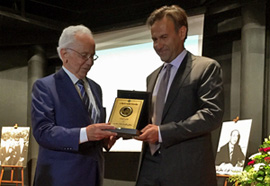
The event opened with the National Anthem. Me Toufik Kfoury presented the speakers, the first of whom was Dr Chafik Muharram. His speech was followed by a video documentary on Minister Boutros’s political life and achievements with focus on his link with President Chehab. Next were the speakers, Dr Charles Rizk, Journalist Sarkis Naoum and Minister Boutros’s son, George Boutros, who thanked the Fouad Chehab Foundation and all those present for honouring his late father.
The event ended with the presentation of an honorary shield from the Fouad Chehab Foundation to Mr George Boutros.
|
The Speeches: – Dr Chafik Mouharram In the Media: – Assafir |
|
The Fouad Chehab Museum
July 11, 2016 – The Fouad Chehab Museum & Library, Jounieh
.jpg)
On July 11, 2016, a special event was held at the Central College for the Lebanese Monks, Jounieh on the occasion of the inauguration of the Fouad Chehab Museum and Library. The event was organized by the Lebanese Maronite Order following the execution of the agreement between the Fouad Chehab Foundation and the Lebanese Maronite Order. The agreement states that the latter takes over the restoration of President Chehab’s house located next the Central College, to convert it into a library and a museum holding President Chehab’s name.
Present at the event were MP Farid Elias El Khazen representing the Speaker of the House Nabih Berri; Minister Abd El Moutleb Hannaoui representing Prime Minister Tammam Salam; a large number of acting and former ministers and MPs; Apostolic Nuncio to Lebanon archbishop Gabriele Caccia, foreign diplomats and consuls; archbishop Antoine Andari; the general superior of Lebanese Maronite Order Father Tannous Nehme and various religious personalities; the Kaemakam of Kesrwan Raymond Hitti; representatives of political parties; representatives of the heads of the national security institutions; the president of Kesrwan’s Federation of Municipalities; Mayor of Jounieh Jwan Hbeich; various political and public figures; members of President Chehab’s family and the Fouad Chehab Foundation.
Journalist Yazbeck Wehbe was the presenter. The event started with the Lebanese National Anthem, followed by a presentation of President Chehab’s main life stations. The speakers at the event were Father Wadih Skayyem, head of the Central College , Me Toufic Kfoury assigned to deliver the Fouad Chehab Foundation speech, Mayor of Jounieh Juan Hobeich, and the head of the High National Institute of Music Walid Musallem representing the Minister of Culture Raymond Araigi.
Singers Nader Khoury and Katia Harb presented patriotic songs in between the speeches. The event ended with a speech by Father Tannous Nehme head of Lebanese Maronite Order who announced the inauguration of the Fouad Chehab Museum and Library.
A documentary on the restoration of President Chehab’s house and its transformation into a Museum and Library was shown before everyone moved to the new Fouad Chehab Museum and Library, where a statue was unveiled in the garden outside the house, Then the Fouad Chehab Foundation invited all present to visit the Museum and Library and enjoy a cocktail in the garden. .
|
The Speeches: – Press release by the Central College
In the Media: – Al Anwar |
|
|
|
Statue at the Military Academy
General Kahwagi unveils a statue of President Chehab at the Military Academy
August 1, 2015- Military Academy, Yerzi
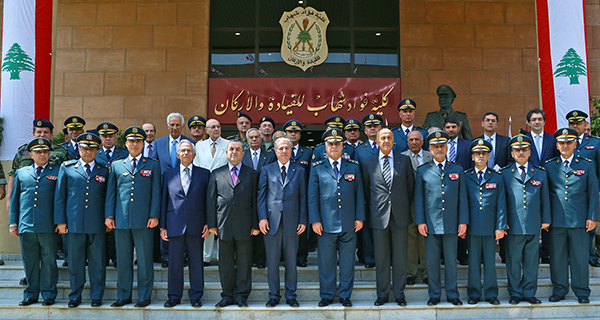
On the occasion of the Army Day and the Lebanese Army’s 70th Anniversary, and under the patronage of Army Commander General Jean Kahwagi, the Army Command honored the late President Fouad Chehab in a ceremony that was held in the ‘Fouad Chehab Academy for Command and General Staff‘, located in Rihaniye near Yerzi. The ceremony included unveiling a bust of President Chehab.
The ceremony was attended by former President Cheikh Amine Gemayel, retired Brigadier General Moussa Zahran representating former President General Emile Lahoud, former Commander of General Staff Major General P.S.C Chawqi el Masri representing former President General Michel Sleiman, deputy Prime Minister and Minister of National Defense Samir Moqbel and Chief of General Staff Major General P.S.C Walid Selman along with numerous high ranking officers, political, economic, cultural and media figures and members from the family of the late President and the Fouad Chehab Foundation.
.jpg)
The ceremony began with the national anthem and a silent moment in honor of the memory of President Chehab and the Army martyrs. Afterwards, General Kahwagi gave a speech on the occasion in which he commended the historic role played by President Fouad Chehab in unifying national principles and building the army on steady grounds as well as state institutions, which continue to be the guarantee for Lebanon’s survival. By reactivating these national institutions boosting their role, the Republic can achieve an era of stability and development. General Kahwagi also reiterated that the Army today continues in the same path Fouad Chehab intended for it; despite the events in the surroundings and the region and despite current divisions, the Army is still not only the common denominator for the Lebanese, but also the main pillar in rebuilding a strong, surviving, and developed Lebanon. General Kahwagi concluded by vowing that the Army will always be inspired by the principles of General Chehab: safeguarding national characteristics and a strong determination to preserve Lebanon as a unified, sovereign and independent country, and a lighthouse in the region and the world.
Afterwards, the President of the Fouad Chehab Foundation, Dr. Chafiq Mouharram, thanked the Command of the Lebanese Army for this gesture, then reminded all present of the achievements of the late President as well as his role in building the state of institutions and the development, economic and social projects that he launched during his mandate. Dr. Mouharram also exposed the work of the Fouad Chehab Foundation with regards to documenting Chehab’s national accomplishments and personal heritage.
|
The Speeches: – General Jean Kahwagi In the Media: – Al Anwar 1 |
|
|
1st National Conference
April 5, 2014 – Central College, Jounieh
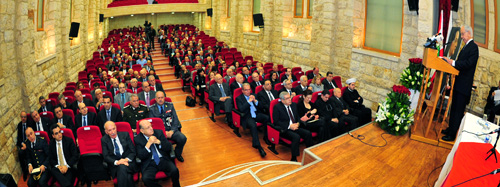
On April 5, 2014, the 1st National Conference event was organized by the Fouad Chehab Foundation at the Central College for the Lebanese Monks, Jounieh, run by the Lebanese Maronite Order and located opposite to President Chehab’s house. The event was under the patronage of President Michel Suleiman.
The location of the event was decided following the agreement between the Fouad Chehab Foundation and the Lebanese Maronite Order that the latter takes over the restoration of President Chehab’s house to convert it into a library and a museum named after President Chehab.
The theme of the conference which marked the 41st Anniversary of President Chehab’s death was: “Chehabism: A State for the Citizen”.
The conference consisted of three seminars: (Invitation – Schedule)
Seminar 1 : “Lebanon’s Foreign Policy under Chehabism and today”
Speakers: Former minister Georges Corm – Dr Ziad Hafez
Coordinators: Ambassador Khalil Makkawi – Journalist Kamil Menassah
Seminar 2 : “The State of Institutions: Modernisation of the System”
Speakers: Former minister Ziad Baroud – Former minister Demianos Kattar
Coordinators: Dr Hassan Awada – Journalist Nicolas Nassif
Seminar 3 : “Chehabism’s vision on Development – Planning & Development Challenges”
Speakers: Former minister Charbel Nahhas – Dr Boutros Labaki
Coordinators: Former minister Adel Hamiyeh – Former minister Sami Minkara
Also present at the event were Minister Abd El Matlab Hennaoui representing the President of the Republic Michel Suleiman; MP Nemtallah Abi Al Nasr representing the Speaker of the House Nabih Berri; Minister Alice Chabtini representing Prime Minister Tammam Salam; former Speaker of the House Hussein El Husseini; former ministers Nazem Khoury, Wadih Khazen, Mohammad Youssef Baydoun; former MP Kamil Ziyadeh; General Mikhael Habis representing Army Commander General Jean Kahwaji; representatives of the heads of the national security institutions; representative of the Mufti of the Republic; president of Kesrwan’s Federation of Municipalities Nouhad Nawfal; former governor of the Central Bank Sheikh Michel El Khoury; members of the Chehab family; various political and public figures and the members of the Fouad Chehab Foundation.
Journalist Michel Maaiki was the presenter. The event started with the Lebanese National Anthem, followed by two welcoming speeches by the president of the Fouad Chehab Foundation Shafik Moharram and the head of the Central College for the Lebanese Monks Jounieh, Father Wadih Skayyem, followed by a brief documentary on President Chehab and his achievements.
Next, Minister Abd El Matlab Hennaoui, representing the President of the Republic Michel Suleiman, gave a speech, before the seminars started.
At the end of the three successive seminars, the attendees walked to President Chehab’s house for a guided visit of the place to check the preparation for renovation works.
|
The Speeches: – Father Wadih Skayyem In the Media: – Al Anwar |
|
|
|
40th Memorial Day
April 23, 2013 – St Joseph University, Beirut
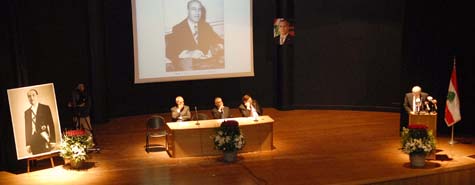
On the occasion of the 40th anniversary of President Chehab’s passing away, and under the patronage of President Michel Suleiman, the Fouad Chehab Foundation held a commemorative event in President Chehab’s memory, at the Saint Joseph University premises (Social Sciences branch) in Beirut.
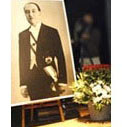
The speakers at the event were H.E. Fouad Boutros (Honorary President of the Fouad Chehab Foundation. Represented at the event by Me Nabil Younes), H.E. Michel Eddeh (Absent due to sickness – His speech was read by the event’s facilitator journalist Michel Maaiki), prominent journalist Talal Salman, Dr Nawaf Kabbara (Professor in Political Sciences and member of the Foundation) and Mr Chafik Mouharram (President of the Foundation).
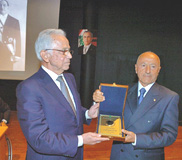
The Minister of Environment Nazem El Khoury represented the President of the Republic Michel Suleiman, and Prime Minister Najib Mikati.
Also present were the Ambassador of France Patrice Paoli; the former Speaker of the House Hussein El Husseini; Mr Sejaan Al Azzi representing former President Amine Gemayel; General Ali Hammud representing Army Commander General Jean Kahwaji; MP Jean Ogassapian representing former Prime Minister Saad Hariri; MP Edgard Maalouf representing General Michel Aoun; Me Walid Sfeir representing MP Walid Joumblatt; Sheikh Salaheldinne Fakhri representing the Mufti Muhammad Kabbani; Bishop Alexis Mufarrej representing Othodox Archbishop of Beirut Elias Awadi; MPs Abdelatif Al Zein, Fouad Saad, Antoun Saad and Jamal Al Jarrah; representatives of the state security services commanders; former Ministers and former MPs Michel Sassine, Sheikh Michel El Khoury, Osman Al Dana, Adel Hamiyyeh, Sami Minkara and Youssef Salameh; the Secretary General of the National Committee for Islamo-Christian Dialogue, Harès Chehab; the President of the Higher Metn Municipalities Union, Karim Sarkis; the President of the Jounieh Municipality, Antoine Frem; in addition to retired officers, various political, economical, municipal, social and media personalities, members of the Fouad Chehab Foundation including Honorary President General Ahmad El Hajj, members of President Chehab’s family and the general public…
Starting with the Lebanese National anthem, the event included a video documentary on President Chehab and his presidential mandate’s achievements. The speakers were introduced by the member of the Foundation, journalist Michel Maaiki. After Mr Moharram’s ending speech, the Foundation’s honorary souvenir was presented to Me Toufic Kfoury, author of the newly published book”Chehabism – A school of Visionary Modernisation”.
|
The Speeches: – H.E. Fouad Boutros In the Media: – Al Anwar |
|
|
Event at the ATCL
August 1, 2012- ATCL club, Kaslik
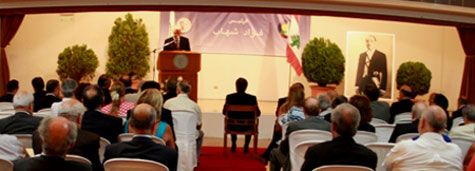
On the occasion of the Army Day (1st August 2012) and under the patronage of President Michel Suleiman, the ATCL club (Automobile et Touring Club du Liban) held a commemorative event in the memory of President Chehab at the club’s premises in Kaslik, with the contribution of the Jounieh Municipality.
Minister of Industry Freij Sabounjian represented the President of the Republic, Michel Suleiman, the Speaker of the House, Nabih Berri, and the Prime Minister, Najib Mikati.
Also present were the Minister of Culture, Gaby Lawon, the Minister of Information, Walid Daouk, Members of the Parliament, a number of former Ministers and former Members of Parliament. Archbishop Boulos Rouhana represented Patriarch Bechara Rahi.
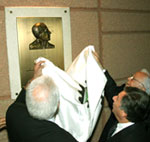
Representatives of the state security services attended the event as well, in addition to various political, economic, municipal, social and media personalities, and members of the Fouad Chehab Foundation.
The speakers at the event were Me Elie Assaf (Head of the Organizing Committee), Mr. Antoine Frem (President of the Jounieh Municipality Council), Mr. Chafik Mouharram (President of the Fouad Chehab Foundation) and former Minister Charles Rizk.
The speeches praised President Chehab’s values, his wise political stands, his reform achievements in paving the way for governmental and administrative institutions and in particular his role in the foundation of the ATCL club.
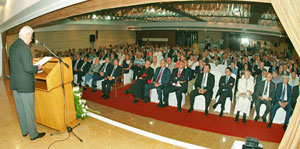
The event included a video documentary on President Chehab and his achievements during his presidential mandate, and the unveiling of the Commemorative Plate of President Chehab at the club. The attendees were invited to a cocktail for the occasion.
|
The Speeches: – Sheikh Fouad El Khazen (ATCL) In the Media: |
Memorial day - Unesco
April 24, 2012- UNESCO Palace, Beirut
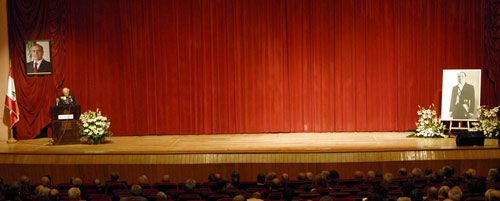
On April 24, 2012, a special event was organized by the Fouad Chehab Foundation at the UNESCO Palace, Beirut, on the anniversary of President Chehab’s death. The event was under the patronage of President Michel Suleiman.

The speakers were former Speaker of the House Hussein El Husseini, former Minister Jean Obeid, Mr Stéphane Malsagne, author of “Fouad Chéhab 1902-1973 – Une Figure Oubliée de l’Histoire Libanaise” published in France in October 2011, and Mr Shafic Muharram, President of the Fouad Chehab Foundation.
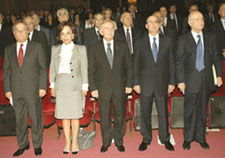
Present at the event were Minister of the Environment Nazem El Khoury, representing the President of the Republic, Michel Suleiman, the Speaker of the House, Nabih Berri and the Prime Minister, Nagib Mikati; Minister of Labor Selim Jreissati; General Nasrat Ghattasrepresenting the Minister of Defense Fayez Ghosn and Army Commander General Jean Kahwaji; MP Edgard Maalouf representing General Michel Aoun; MPs Abdel Latif Al Zein, Antoun Saad and Fouad Saad; Father Boutros Azar representing Patriarch Bechara Al Rahi; the President of the State Constitutional Council, Issam Suleiman; representatives of the state security services commanders; former Ministers Nayla Moawad and Sami El Khatib; former Army Commander General Ibrahim Tannous; in addition to former Ministers, former MPs, retired Army officers, various religious, political, public and media figures, and the members of the Fouad Chehab Foundation.
The event started with the Lebanese National Anthem, followed by a brief documentary on President Chehab and his achievements. Journalist Michel Maaiki presented the speakers.
|
The Speeches: – Speaker Hussein El Husseini In the Media: – Assafir |
|
|
‘The Fouad Chehab Republic’ book
The event took place on November 25, 2008 at the UNESCO in Beirut.
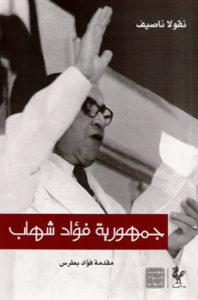
Talk by former Speaker Hussein Husseini at the event of the publication of the book – Unesco, November 25, 2008
Article by Samir Atallah on the occasion of the publication of the book – Annahar, November 26, 2008
Article by Fouad Daaboul, at the publication of the book – Al Anwar, November 26, 2008
Article by Talal Salman, after the publication of the book – Assafir, December 5, 2008
Article by Abd El Rahman Abd El Mawla El Solh, after the publication of the book – Annahar, December 6, 2008
Talk by General Jean Nassif at a conference about the book – February 2, 2009
Article by Joseph Bassil, about the book – Annahar, February 5, 2009




































































